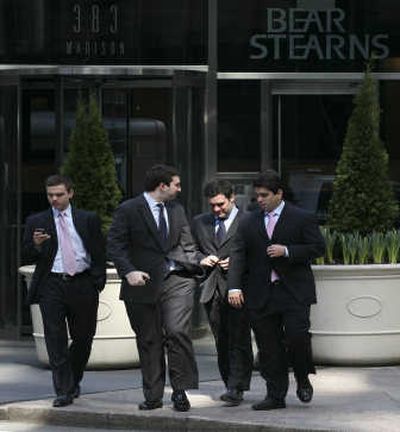Bitten by a bear

One day, stocks are down and gold is up. The next day, precious metals plunge and stocks soar. Pity the poor 401(k) investor. Last quarter’s market volatility — the highest in five years — was enough to give anyone an anxiety headache.
If you’re puzzled about what to do right now with your retirement money, you’ve got plenty of company. So we’re presenting two views on the stock market — one bullish, the other bearish — from two first-rate mutual fund managers. You can decide which one is most helpful.
Bearish
First, a word from the bears. Robert Rodriguez is a switch-hitter: He’s one of the few fund managers who runs both a stock and bond fund. Each of his funds scores in the top 25 percent of its investment category. But Rodriguez says he worries about near-term threats to both the stock and bond markets.
“Our conclusion is that we’re going into a period of longer-term inflation,” Rodriguez says. His reasoning: The Federal Reserve has been too focused on avoiding recession and not focused enough on combating rising prices. “In our opinion, the Fed is proceeding down a road that’s inflationary,” Rodriguez says.
He titled his most recent investment outlook “Crossing the Rubicon,” a reference to Roman history that now means an irrevocable decision. To Rodriguez, the die was cast for inflation once the Fed bailed out Bear Stearns, the troubled investment bank. By assisting in the Bear Stearns merger with JPMorgan Chase, Rodriguez thinks, the government is heightening the risk that other, similar investment firms will expect to be bailed out, too, if they run into trouble.
For his bond fund, FPA New Income, Rodriguez has become ultra-defensive, buying only very short-term, high-quality bonds. One measure of how cautious he has become: The average security in the portfolio matures in less than one year. “My basic feeling is that long-term Treasury yields of 3 percent to 4 percent have no inherent investment value,” Rodriguez says.
FPA Capital, his stock fund, is 40 percent in money market securities, or cash. And he’s gone on a temporary “buyer’s strike,” adding no new holdings to the fund until the environment seems more stable. “Earnings expectations are too high,” Rodriguez says. Even if a recovery takes root in the second half of the year — the current consensus on Wall Street — it’ll be modest at best, he believes.
Bullish
On the bull side is Dan Chung, chief investment officer for the Alger funds. His Alger MidCap Growth ranks in the top 20 percent of all midcap growth funds over the past five years, according to Morningstar, the investment trackers. Chung feels that much of the broad-based stock sell-off of the past few weeks was sparked not by broad-based economic fundamentals but by troubles in the financial sector and credit markets.
“We’re seeing some pain in housing and consumer spending, but the stock market’s reaction has been overly punishing across the board,” Chung says.
Even fears about real estate may be overstated, he thinks. “From 2004 through 2007, a significant number of homes bought were second homes, vacation homes or investments,” Chung says. “That’s a large part of the bubble.” Having investors absorb losses on bad real estate investments isn’t as damaging, he says, as it would be if those investors were losing their primary homes.
Even though the world economy is slowing, Chung says, it’s still growing at a faster pace than in the United States. China’s economy, for example, has fallen from its double-digit pace of last year, but it’s still growing at a robust 8 percent to 9 percent. Overseas growth will mean solid earnings growth in technology, industrial and health care, Chung says, thanks to demand from abroad.
Technology stocks are cheap now, at least relative to their earnings, he says. Many tech companies also have sizable stockpiles of cash on their balance sheets, so they’re not highly vulnerable to the credit crunch. Even better, they derive a good chunk of their earnings from overseas.
So which one is right? You may not have long to wait to find out. Companies will be reporting first-quarter earnings over the next few weeks. If the results are dismal, the bear-market case could have longer to run. But if companies report that business was better than expected, the second half of 2008 could prove much happier than the first.